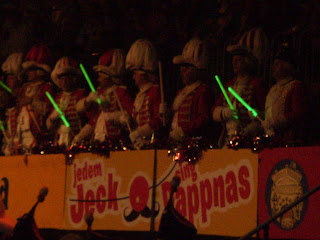German Karnival/Fasching is something that is not easily explained. It is referred to as the "5th season" (as in winter, spring, etc) and technically lasts from 11/11 to the day before Ash Wednesday. The high days of it seem to be the kick-off, 11/11, and the last 5 or 6 days of the period. This was how I tried to describe it once, which a few native German friends thought was fairly close:
It is sort of like going in costume to the largest Irish pub ever and not knowing the words to ANY of the drinking songs that, evidently, EVERYONE else knows. That, combined with being at a huge concert of your favorite band, and "your" team being in the National Championships surrounded by all of its fans-and you there cheering while having candy and flowers thrown at you.
Now, imagine 14,000 people filling the Fedex Forum, Mellon Center, or your local NBA area five nights in a row (different people each night) watching "acts" [bands of old guys singing the aforementioned songs, seemingly retired, sparkly, cruise-ship singers also singing songs about how great whatever city it is is, cheerleaders in short, German brauhaus dresses doing junior high school cheerleading stunts and pyramids, with a few comedians mixed in (speaking German, of course!)], while the audience sings and celebrates, in costume.
The next night you might go to a ball with EVERYONE in great costumes (not like the sort-of, half committed costumes you would likely see on half the people in the US) and sing the same songs after watching the host "troop" (ours was the Roten Funken, the oldest in Cologne with approximately 450 members dressed in wool uniforms that resemble those of Prussian soldiers in formal attire) perform their traditional "routine" that sort of pokes fun of the poor guarding techniques used by the soliders who were supposed to be guarding the wall around/city when it was taken. The next day (after getting a few hours sleep) you can head out to the local parades.
Sort of a home-town version of the Rosenmontag (Rose Monday) parades, where flowers are thrown to the ladies and candy is thrown by the ton to children and adults alike along the parade route. BTW, the parade has the same songs that you still don't know the words to, but by now you have gathered that they are all about how great the city is. Rosenmontag (falls on the Monday prior to Ash Wednesday) is the crowning event of Karnival and boasts a parade in Cologne much like a Marti Gras/Rose Bowl/Macy's Thanksgiving Day parade combined. Of course, you are now in day 5 or 6 of wearing costumes so you may have changed it up a bit. In our case, Josh was the only one well attired for this particular parade as he was sporting a silver hard hat (think The Village People) and was fairly protected from the barrage of flying candy bars-I mean full sized bars, not minis!
We left with 3 or 4 shopping bags of candy and we scooted out at about the half-way point! It is insane! I should note, that this is a description of Karnival in Cologne-supposedly the largest celebration in Germany-as we experienced it, and that different cities have different songs, slightly different traditions, and slightly different "goodies" for adults on Rosenmontag, but evidently loads of candy is a constant if they are celebrating. In the North of Germany, Karnival is a season to go sort of all-out prior to lent, where as in the South of Germany, it (is called Fasching) is to ward off the winter spirits and encourage the arrival of spring. Our sweet friend Rolf, an Officer of the Roten Funken (who should, ahem, perhaps try to make it to one of the lightsabre rehearsals next year), gave us an incredible insiders experience of Karnival for which we are very grateful and perhaps even still a bit sleep deprived.
Either way you cut it, it is hard not to get caught up in Karnival if you are in an area that is celebrating! It is, without exaggeration, the most festive thing I have ever participated in. The German people are very committed and can PARTY! Kolle Alaaf! Carmellan!!!!














No comments:
Post a Comment